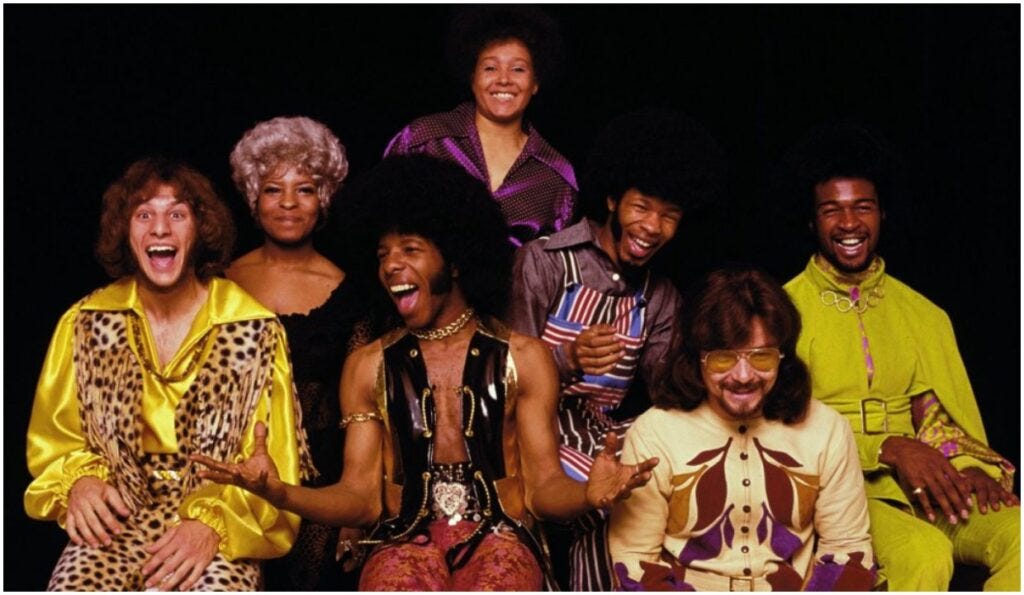Sly and the Family Stone
Sly and the Family Stone, formed in 1966, were pivotal in the development of American music, fusing soul, funk, rock, and psychedelia into a vibrant, groundbreaking sound.
Sly and the Family Stone, formed in San Francisco, California, in 1966, were pivotal in the development of American music, fusing soul, funk, rock, and psychedelia into a vibrant, groundbreaking sound. The band's leader, Sly Stone (born Sylvester Stewart on March 15, 1943), was a musical visionary whose innovations laid the groundwork for numerous genres and influenced countless artists.
Formation and Early Years
Sly Stone's musical journey began in a deeply religious, musically gifted family. Before founding the band, Sly had already made a name for himself as a DJ, producer, and part of the doo-wop group The Viscaynes. The formation of Sly and the Family Stone brought together Sly's family members and friends, creating one of the first major racially and gender-integrated bands in America. The original lineup consisted of:
Sly Stone (Sylvester Stewart): vocals, organ, guitar, bass guitar, piano, harmonica, and more.
Freddie Stone (Frederick Stewart): vocals and guitar.
Larry Graham: vocals and bass guitar.
Rose Stone (Rosemary Stewart): vocals and keyboards.
Cynthia Robinson: trumpet and vocal ad-libs.
Jerry Martini: saxophone.
Greg Errico: drums
Musical Career and Rise to Fame
The band's debut album, "A Whole New Thing" (1967), although not a commercial success, set the stage for their breakthrough. Their second album, "Dance to the Music" (1968), was a hit, featuring the eponymous single that introduced their innovative sound to a wider audience.
In 1969, "Stand!" solidified their place in music history with anthems like "Everyday People," "I Want to Take You Higher," "Sing a Simple Song," and "Stand!" This album captured the spirit of the times, blending infectious grooves with messages of unity and social consciousness.
Woodstock and Beyond
The band's performance at Woodstock in 1969 was a historic moment, showcasing their electric stage presence and musical prowess. However, it was the release of "There's a Riot Goin' On" in 1971 that marked a significant shift in the band's sound and lyrical themes, reflecting a darker, more introspective tone. This album, featuring the hit "Family Affair," is often considered one of the greatest albums in music history, though it signaled the beginning of the band's decline.
Decline and Legacy
Internal strife, exacerbated by Sly's drug problems, led to the departure of key members, including Larry Graham and Greg Errico. Subsequent albums, such as "Fresh" (1973) and "Small Talk" (1974), failed to capture the magic of their earlier work. Despite attempts at comebacks, the original magic of Sly and the Family Stone was never fully recaptured.
Legacy
Sly and the Family Stone's influence on music is immeasurable. They pioneered funk and influenced the development of soul, rock, and hip-hop. Their approach to race and gender in band composition was revolutionary, mirroring the social changes of their time. They were inducted into the Rock and Roll Hall of Fame in 1993, cementing their legacy as one of the most important bands in the history of American music.
Despite the band's turbulent history and Sly Stone's personal struggles, their music continues to resonate with audiences worldwide, embodying the ideals of peace, love, and social justice, and their innovative sound remains a benchmark in music history.
